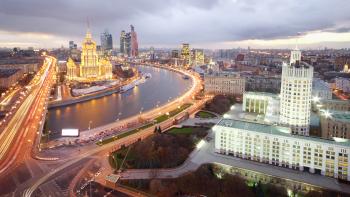 Connecting Europe and Asia
Connecting Europe and Asia
Being the bridge between Europe and Asia, the region includes Member States of the Commonwealth of Independent States, Georgia, six countries from the Economic Cooperation Organization region, and Central Asian countries.
IRU works with its members and partners in the region to drive a safer, more efficient and greener road transport sector.
Safe
IRU’s Academy Associate Training Institutes (ATIs) and cooperation with local authorities is making commercial road transport safer for everyone across Eurasia. IRU ATIs train and certify thousands of mobility and transport logistic professionals every year based on internationally recognised standards.
Bus and truck companies are increasingly using RoadMasters, IRU’s risk and talent management solution, to optimise operations and address performance gaps, including HSE (health, safety and environment) performance, road safety and driver retention.
Efficient
Modernising roadside and ancillary infrastructure are central to increasing the region’s connectivity to European and Asian markets. Transport costs are at least 50% higher in landlocked countries. Reducing non-tariff barriers is key to bolster economies. Central Asia and Europe’s road freight volumes surged 60% and 68%, respectively, following accession to the TIR system.
TIR continues to play a vital role in facilitating trade and transport while maintaining the security and transparency of cross-border shipments. Eurasia accounts for nearly half of all global TIR issuances.
The region is also spearheading efforts to digitalise trade and transit, including TIR processes with TIR IT tools and eTIR. Dedicated lanes for secure TIR transport coupled with TIR-EPD advance cargo information are further improving the efficiency and security of trade. Risk-based prioritisation of cargo flows facilitate border-crossing procedures, enhancing transport connectivity and stimulating regional and global trade.
Eurasia is also rapidly growing in e-CMR accessions, 9 out of 13 countries have joined the protocol, steering closer to fully digital goods transport. In 2022, Azerbaijan, Kyrgyzstan and Turkmenistan joined e-CMR.
Green
Transport companies in Eurasia are using the RoadMasters eco-driving programme to increase their fuel efficiency by up to 15%, a pillar of IRU’s Green Compact.
The road transport industry is committed to reaching carbon neutrality by 2050, as outlined in IRU’s Green Compact. The Green Compact research will be extended to Eurasia in the coming years to identify the most cost-effective and pragmatic approach to decarbonising the sector while continuing to effectively meet demand for transport services.
As part of its trade and transit facilitation efforts, IRU is also working to reduce long border queues, preventing trucks from emitting CO₂ emissions while idling at borders for days and weeks.
IRU in Eurasia
Two thirds of Eurasian countries are landlocked, making road transport indispensable to regional and global trade. IRU helps Eurasian countries with mobility and logistics policy-making, professional training and trade facilitation.
Being the bridge between Europe and Asia, the region includes Member States of the Commonwealth of Independent States, Georgia, six countries from the Economic Cooperation Organization region, and Central Asian countries.
IRU works with its members and partners in the region to drive a safer, more efficient and greener road transport sector.
Safe
IRU’s Academy Associate Training Institutes (ATIs) and cooperation with local authorities is making commercial road transport safer for everyone across Eurasia. IRU ATIs train and certify thousands of mobility and transport logistic professionals every year based on internationally recognised standards.
Bus and truck companies are increasingly using RoadMasters, IRU’s risk and talent management solution, to optimise operations and address performance gaps, including HSE (health, safety and environment) performance, road safety and driver retention.
Efficient
Modernising roadside and ancillary infrastructure are central to increasing the region’s connectivity to European and Asian markets. Transport costs are at least 50% higher in landlocked countries. Reducing non-tariff barriers is key to bolster economies. Central Asia and Europe’s road freight volumes surged 60% and 68%, respectively, following accession to the TIR system.
TIR continues to play a vital role in facilitating trade and transport while maintaining the security and transparency of cross-border shipments. Eurasia accounts for nearly half of all global TIR issuances.
The region is also spearheading efforts to digitalise trade and transit, including TIR processes with TIR IT tools and eTIR. Dedicated lanes for secure TIR transport coupled with TIR-EPD advance cargo information are further improving the efficiency and security of trade. Risk-based prioritisation of cargo flows facilitate border-crossing procedures, enhancing transport connectivity and stimulating regional and global trade.
Eurasia is also rapidly growing in e-CMR accessions, 9 out of 13 countries have joined the protocol, steering closer to fully digital goods transport. In 2022, Azerbaijan, Kyrgyzstan and Turkmenistan joined e-CMR.
Green
Transport companies in Eurasia are using the RoadMasters eco-driving programme to increase their fuel efficiency by up to 15%, a pillar of IRU’s Green Compact.
The road transport industry is committed to reaching carbon neutrality by 2050, as outlined in IRU’s Green Compact. The Green Compact research will be extended to Eurasia in the coming years to identify the most cost-effective and pragmatic approach to decarbonising the sector while continuing to effectively meet demand for transport services.
As part of its trade and transit facilitation efforts, IRU is also working to reduce long border queues, preventing trucks from emitting CO₂ emissions while idling at borders for days and weeks.
IRU regional office
General Delegate: Vadim Zakharenko
Office 1421, entr. 6
World Trade Center
12 Krasnopresnenskaya nab.
Moscow 123610, Russia
Tel: +7 495 258 17 59
Regional news
Beijing
Flowers from Yinchuan: TIR in China sparks fresh new road transport options
Beijing
New secure trade opportunities as China widens TIR operations
Vienna
Minutes, not maps: making borders work for the Middle Corridor
Istanbul
ECO region push on trade facilitation and digital border solutions
Tashkent
The Middle Corridor: A world of opportunities
IRU members in Eurasia
Baku
ABADA
Dushanbe
ABBAT
Yerevan
AIRCA
Tashkent
AIRCUZ
Bishkek
AIRTO KR
Chisinau
AITA
Moscow
ASMAP
Kiev
ASMAP UA
Minsk
BAMAP
Tbilisi
GIRCA
Almaty
KAZATO
Ulaanbaatar
NARTAM
Ashgabat
THADA
IRU partners in Eurasia